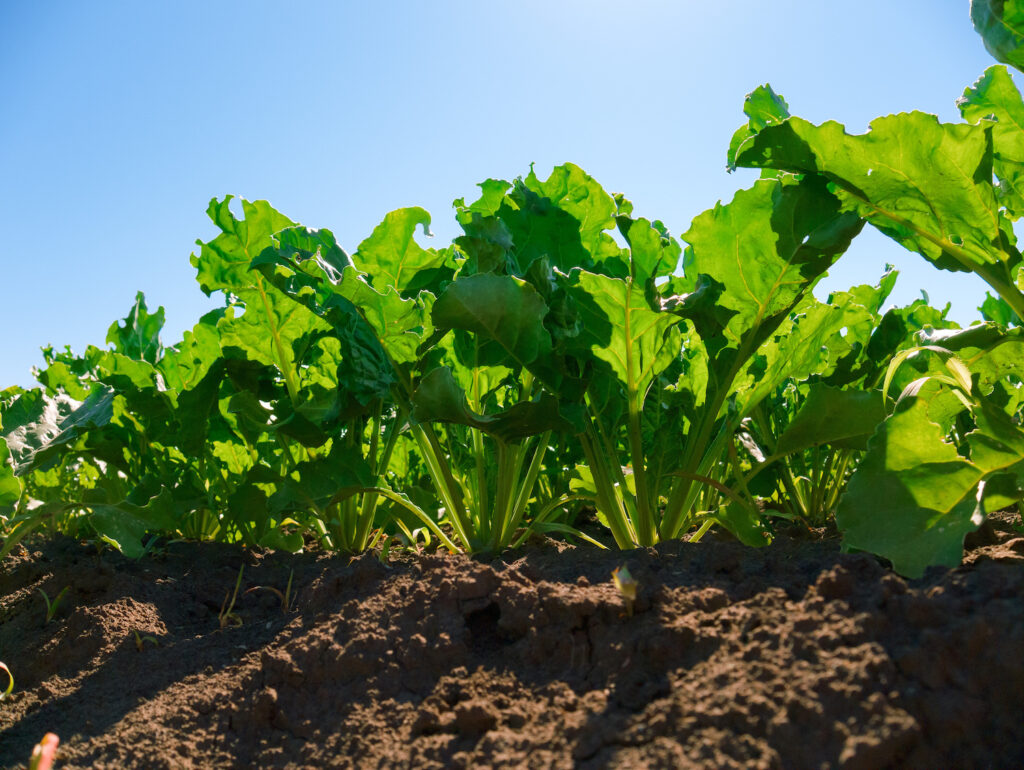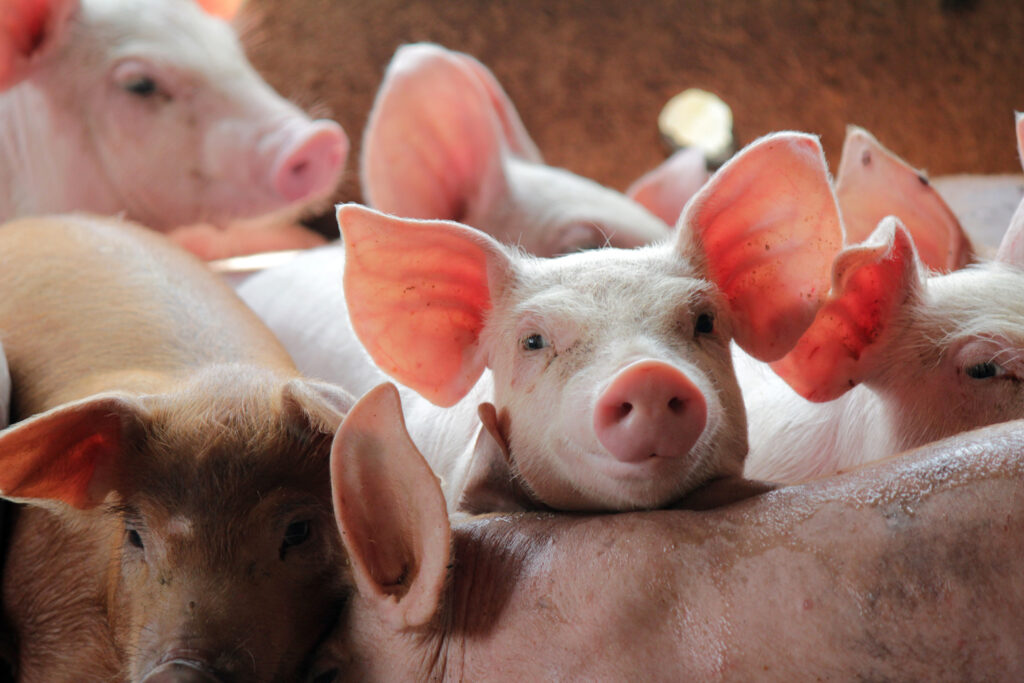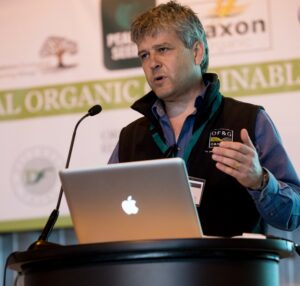Plans for gene-edited crops could offer “huge benefits”
29th September 2021
Defra has unveiled new plans to enable the use of gene editing technologies, to help farmers grow crops that are more nutritious, productive and resistant to pests and disease.

For British farmers, virus yellows resistance in sugar beet is an “obvious early target”, since the withdrawal of neonicotinoid seed dressings has left the crop vulnerable to massive yield losses, says NIAB chief executive Dr Tina Barsby.
Environment secretary George Eustice has today (29th September) set out plans to pave the way for the use of gene editing, a tool that makes plant breeding more precise and efficient, helping farmers and reducing impacts on the environment.
As a first step, the government said it will change the rules relating to gene editing to cut red tape and make research and development easier.
Unlike genetically modified (GM) crops, which often involve the addition of extra genes, gene-edited (GE) crops often produce varieties that could have been produced through traditional cross-breeding, but much more quickly. However, EU regulations dictate that GE crops are treated the same as GM crops.
The government’s announcement has prompted mixed views, with some welcoming the move to a “pro-science approach” while others have raised concerns about the potential implications.
“Virtually limitless possibilities”
Crop science organisation NIAB said the news marks an important step towards more proportionate and enabling regulation of these technologies, and gives a boost to prospects for UK plant science.
New research could lead to sugar beet varieties resistant to viruses that can cause serious yield losses and costs to farmers unless pesticides are used. Such new varieties would help boost productivity and reduce the need for chemical pesticides, protecting bees and other pollinating insects.
Last year, NIAB chief executive Dr Tina Barsby brought a group of leading scientists together to support a letter urging the government to change the legal definition of GMO, so that gene edited organisms whose DNA changes could have occurred naturally or through traditional breeding methods should not be regulated as GMOs.
This was supported by cross-party politicians, farmers, plant breeders, food processors and other agri-food organisations, and the government ran a public consultation from January to March 2021.
Dr Barsby said today’s announcement suggests Britain is adopting a more “pro-science approach” outside the EU and boosting prospects for inward investment and international research collaboration.
“Innovation in plant breeding will be the single most important factor in helping global food supplies keep pace with a growing world population in the face of climate change and pressure on finite natural resources of land, water, energy and biodiversity,” she said.
“In terms of breeding objectives, there are virtually limitless possibilities to accelerate the development of more productive and sustainable food systems, with crops more resistant to diseases, environmental conditions and climate change effects, food products with improved nutritional qualities, and reduced need for agricultural inputs such as pesticides.”
For British farmers, virus yellows resistance in sugar beet is an “obvious early target”, she added, since the withdrawal of neonicotinoid seed dressings has left the crop vulnerable to massive yield losses.
NIAB is also keen to explore the potential for gene editing to transform the performance of leguminous crops such as faba beans and soybeans under UK growing conditions.
“These are neglected crops in terms of breeding effort, and yet the economic, environmental and climate change opportunities presented by these break crops, as a Nitrogen-fixing source of home-grown, plant-based protein for human and livestock consumption, are hugely significant.”
Opportunities for organic farmers
Dr Barsby also highlighted the opportunities for precision breeding techniques such as gene editing to support prospects for agroecological approaches to farming and food production, and called for organic sector bodies in particular to keep an open mind on the potential benefits:
“By accelerating the development of improved disease or pest resistance, making crops more resilient to stress, or adapting crops to perform better under low-input conditions, these new breeding tools have as much, if not more, to offer low-input systems such as organic farming. I know many organic farmers are not comfortable with using copper-based fungicides, or relying on non-organic seeds to give organic crops a healthy start. Gene editing can offer alternative solutions.
“I would therefore encourage grass-roots organic farmers to take a stand against the doctrinal opposition of their certifying bodies, and urge them to keep an open mind on the potential for these technologies to make low-input farming a more sustainable option, environmentally and economically.”
Science-based approach welcomed
Samantha Brooke, chief executive of the British Society of Plant Breeders, described the news as “the most significant policy breakthrough in UK plant breeding for more than 20 years”, adding that the organisation “strongly welcomes” the decision to make controls on gene editing more science-based.
“Without the contribution of plant breeding over the past 20 years, farmers would have produced 20% less food in this country, which means an extra 1.8 million hectares of land would have been needed to supply our food needs,” she explained. “That expansion would have impacted vulnerable ecosystems, and generated an extra 300 million tonnes of greenhouse gas emissions.
“Current regulations on plant breeding and seeds support safer and more sustainable food production, and this regulatory system can also embrace new crop varieties produced using gene editing techniques, which replicate what plant breeders are already doing, but in a much quicker and more targeted way.”
Achieving net zero and boosting profitability
The NFU also described the move as “very encouraging”. Vice president Tom Bradshaw said it has the potential to offer “huge benefits” to UK farming and will be vital to achieving net zero ambitions.
“The world’s climate emergency points to the urgency of applying this technology to farming and this announcement is an important first step towards a properly functioning legislative system.”
He said the new tools could help farmers in a number of ways, from tackling pest and disease pressures on crops and farm animals, and improving animal health and welfare, to increasing farmers’ resilience during extreme weather events and benefiting the environment through more efficient use of resources. This would mean lower emissions and less waste, improving sustainability and profitability.
Mr Bradshaw added: “We know gene editing is not a silver bullet. But if we are to make this a success, any new government regulation must be robust, fit for purpose and based on sound science. This will in turn provide public confidence, enable diverse and accessible innovation, and allow investment in products for the UK market.”
The NFU also urged the government to provide the necessary researchers and companies with a clear timetable, and to work closely with the devolved administrations.

Some organisations have urged the government not to allow gene editing of livestock.
Mixed views
Organic Farmers & Growers (OF&G), a leading UK organic certification body, expressed unease over Defra’s announcement, however. Chief executive Roger Kerr (pictured) said:
“It has been long anticipated that the deregulation of GE was a ‘done deal’ but coming at a time when agricultural policy is going through such upheaval, there is little or no evidence that the much vaunted GE ‘sticking plaster’ will effectively tackle the current social and environmental emergencies we are told that it will.”
He added: “[…] With our biodiversity and environment already under huge stress, any new strategy needs to be fully tested and an independent impact assessment made before being released into the natural environment.
“As such, OF&G recommends that the manipulation of genetic material should only be carried out under a robust, fully transparent regulatory framework. The government has a duty to give both farmers and shoppers a choice; from variety breeding through to product labelling, similar to the stringent regulation organic licensees achieve year-on-year.”
Compassion in World Farming’s chief policy advisor Peter Stevenson, also urged Defra not to allow gene editing of animals, other than in the most exceptional circumstances due to fears over animal welfare. The Rare Breeds Survival Trust also said on Twitter that rather than gene-editing livestock in a lab, the government ‘should instead be facilitating the use of our native livestock breeds in extensive systems’.
Announcing the decision Mr Eustice commented: “Gene editing has the ability to harness the genetic resources that nature has provided. It is a tool that could help us in order to tackle some of the biggest challenges that we face – around food security, climate change and biodiversity loss.
“Outside the EU, we are able to foster innovation to help grow plants that are stronger and more resilient to climate change. We will be working closely with farming and environmental groups to ensure that the right rules are in place.”

